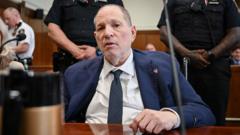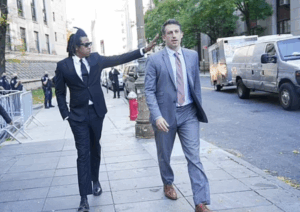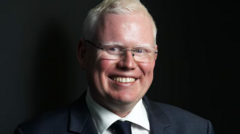The latest decision marks ongoing complexities in Weinstein's legal battles following previous convictions and ongoing allegations.
Mistrial Declared in Harvey Weinstein's Rape Case as Jury Tensions Escalate

Mistrial Declared in Harvey Weinstein's Rape Case as Jury Tensions Escalate
A New York judge's decision leads to a mistrial after a juror expresses fear of further deliberation.
In a significant twist in an already convoluted legal saga, a New York judge has declared a mistrial on a rape charge against Harvey Weinstein due to the refusal of one juror to continue deliberating on the specifics of an alleged attack in 2013 involving actress Jessica Mann. The jury had previously found Weinstein guilty of one count of sexual assault while acquitting him of another charge. However, the dynamic among jurors took a turn for the worse, ultimately resulting in Thursday's mistrial declaration after this juror expressed reluctance to re-enter the discussion.
The case against Weinstein had already been fraught with tension, as described by the jury foreperson who reported aggressive interactions among jurors during deliberations. This included claims of verbal altercations and aggressive behavior—alarming enough for the foreperson to appeal for intervention. Judge Curtis Farber acknowledged the heightened emotions surrounding the deliberations and underscored the importance of a calm environment for such discussions.
The current trial follows a previous conviction that was overturned on appeal, which claimed Weinstein did not receive fair treatment and that prejudicial testimony from unrelated accusers had unduly influenced the jury. This retrial encompassed allegations from three women, including Mann, who have come forward with detailed accounts of Weinstein's conduct. The jury found Weinstein guilty of assaulting former production assistant Miriam Haley but cleared him of charges related to Polish model Kaja Sokola, leading to the mistrial for the charge involving Mann.
Earlier convictions related to other crimes in Los Angeles are still pending, as Weinstein's legal woes mount. This complex case continues to unfold, revealing the intricacies of the judicial process as it intersects with the societal impacts of the #MeToo movement.
The case against Weinstein had already been fraught with tension, as described by the jury foreperson who reported aggressive interactions among jurors during deliberations. This included claims of verbal altercations and aggressive behavior—alarming enough for the foreperson to appeal for intervention. Judge Curtis Farber acknowledged the heightened emotions surrounding the deliberations and underscored the importance of a calm environment for such discussions.
The current trial follows a previous conviction that was overturned on appeal, which claimed Weinstein did not receive fair treatment and that prejudicial testimony from unrelated accusers had unduly influenced the jury. This retrial encompassed allegations from three women, including Mann, who have come forward with detailed accounts of Weinstein's conduct. The jury found Weinstein guilty of assaulting former production assistant Miriam Haley but cleared him of charges related to Polish model Kaja Sokola, leading to the mistrial for the charge involving Mann.
Earlier convictions related to other crimes in Los Angeles are still pending, as Weinstein's legal woes mount. This complex case continues to unfold, revealing the intricacies of the judicial process as it intersects with the societal impacts of the #MeToo movement.


















